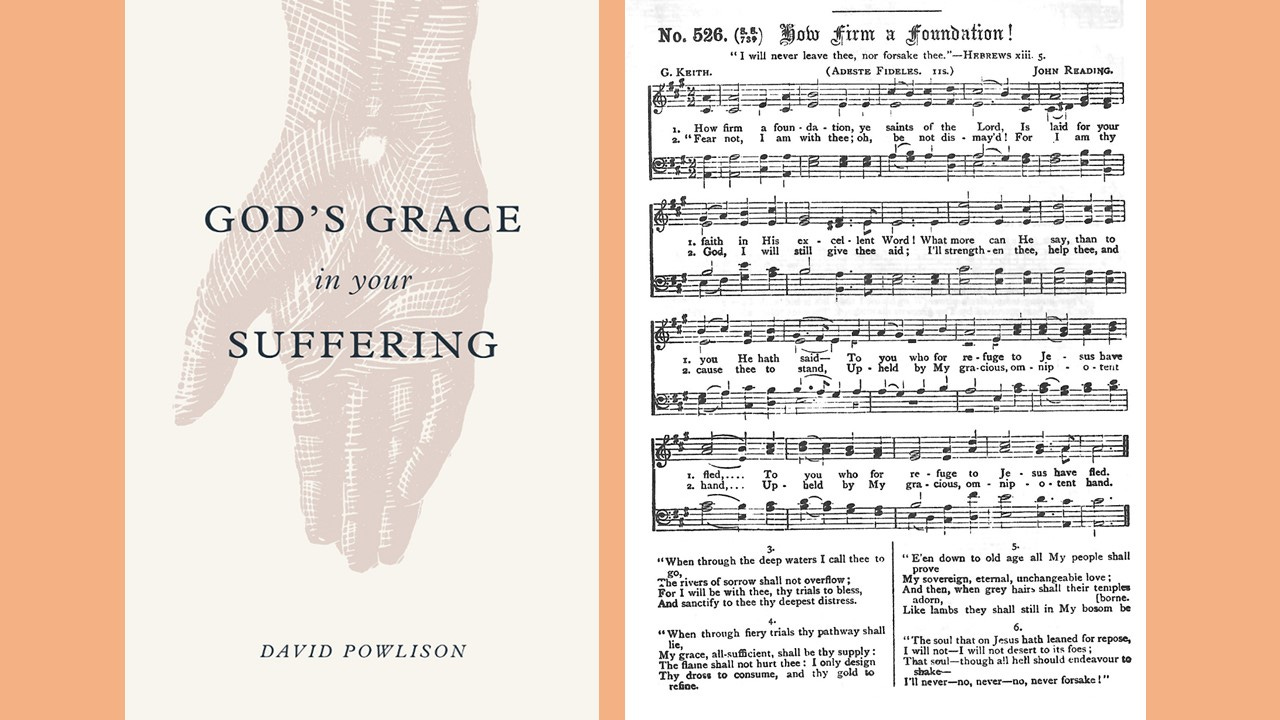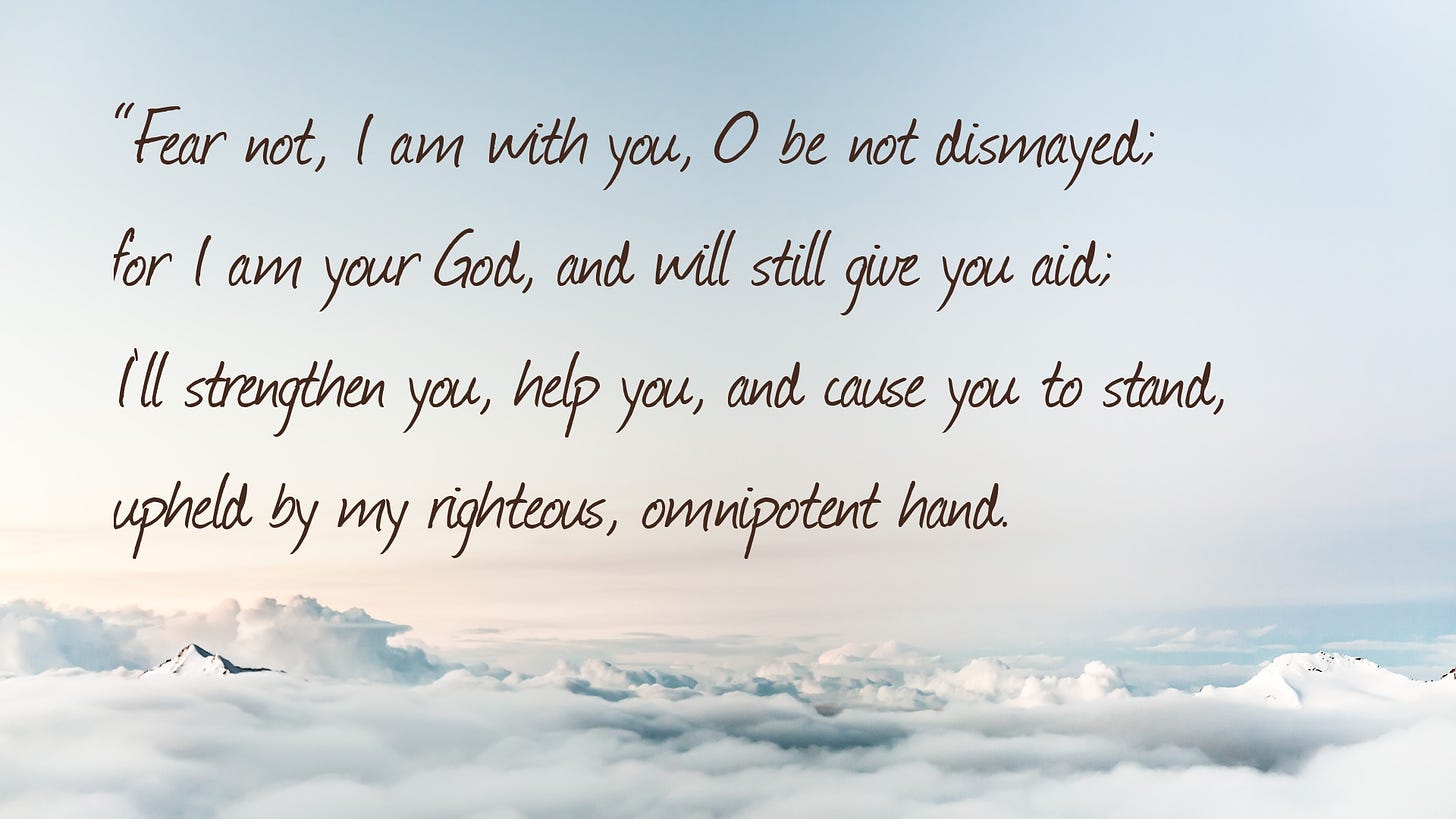“How Firm a Foundation” is a hymn that has brought me much comfort in my current season of depression. Recently, a friend recommended a book based on the hymn, written by the commonly misspelt author David “not Powlinson” Powlison. With 1 endorsement per 17.7 pages, God’s Grace in Your Suffering (Crossway, 2018) journeys stanza-by-stanza through the hymn, highlighting biblical truths behind the words and the implications of these truths for times of suffering. Each chapter also includes some reflections from David P’s personal experience, and some suggestions for applying the chapter to your own circumstances.
As I’ve been reading the book, I’ve found fresh encouragement in the hymn’s words. And if you keep reading this post, maybe you’ll discover some of that fresh encouragement too.
I am with you
“I am with you.” Four simple words, offering deep reassurance in any season of darkness. And one of the wonderful things about “How Firm a Foundation” is the way each stanza reiterates this promise, “supplying us with fresh metaphors to evoke a difference nuance of God’s inexhaustible riches of presence, wisdom, and love” (97).
In the second verse, the hymn paraphrases Isaiah 41:10 to give us seven specific promises from God’s word. And from this verse onwards, the hymn is written as direct divine speech, so we hear these words of reassurance coming from God’s own lips. Whatever we’re going through, whatever reasons we have to be anxious and fearful, whatever storm is raging in our minds, he is with us. He is our God. He will strengthen us. He will help us. He will uphold us with his righteous right hand.
At this point in his reflections, I appreciated David Powlison’s presentation of Jesus as both the hearer and speaker of these words. As the founder and perfecter of our faith, Jesus “heard this voice and took it to heart.” And now, this Jesus “says these same things to you” (50). And, even more, as our great high priest, Jesus helps us to be good listeners when we find it hard to hear in the darkness. He knows and understands our struggles to trust. He understands our tendency to become self-absorbed in times of suffering. He is “fully aware of our temptations to be forgetful, distracted, and inattentive” (51). And he deals gently with us to strengthen us, help us and cause us to stand.
It was also helpful to think about how these divine promises reassure us in our experience of “doubled pain”. This is Powlison’s phrase for the ways the pain of our original hardship can be compounded by the unhelpful responses of others (however well-meaning). In my experiences of depression, I’ve been blessed by good support from many sources. But I’ve also experienced the perplexing silence of friends, and misguided attempts to diagnose and fix me. God’s reassurance of his presence answers these feelings of dismay and isolation. And his answer is the best answer of all: “He answers with himself” (55).
I will be with you
As the hymn continues, we see how God’s promises give us hope for tomorrow as well as reassurance for today. He is with us, and he will be with us. And he will be with us in an active sense, not just lurking nearby. As the third stanza reminds us, God calls us into the deep waters, and sets a boundary on them. He brings good out of our troubles, and changes us through our times of distress. In the words of the following verse, he works to consume our dross and refine our gold.
One of the ways God refines our gold, which David Powlison highlights, is found in 2 Corinthians 1:4 — the God of comfort “comforts us in all our affliction, so that we may be able to comfort those who are in any affliction, with the comfort with which we ourselves are comforted by God.” This is a promise I’ve found true through my experiences of depression, on both sides of the equation. But one thing I hadn’t thought about much before is the use of the word “any” in that promise. In the author’s words, God “turns our faith and love into generalizable skills… The comfort you receive from God in your particular affliction becomes helpful to others in any affliction” (84).
Alongside these reminders of how God’s grace brings good out of darkness, the author challenges a common misapplication. When we emphasise God’s sovereignty, we can sometimes feel an obligation to pursue a kind of stoic detachment from sufferings, where we just silently accept trouble as part of God’s will. But the Bible doesn’t commend this approach. The psalm writers, for example, don’t minimise their troubles. Our distresses are still distressing, and we don’t need to pretend otherwise. The hymn’s words underline this, describing vividly the deep waters and rivers of sorrow, the troubles and deepest distress.
In this connection, David Powlison discusses 1 Peter 4:19 as an oft-misapplied verse. In times of suffering, Peter calls us to entrust our souls to a faithful Creator. But what does this look like? The example of Jesus gives us an answer, and it isn’t stoicism. In Gethsemane and at Golgotha, it means crying out with words of lament. It means praying with “loud cries and tears” (Hebrews 5:7). In fact, the word “entrust” in 1 Peter 4:19 is the same word we find on Jesus’s lips in Luke 23:46, when he commits his spirit into God’s hands. “Peter intentionally calls us to the pattern of Jesus’s anguished faith on the cross” (68). It’s in our honest engagement with our circumstances that we find God sanctifying our deepest distress.
Why me?
Among the other encouragements in the book, some words in the book’s final section (“Coda”) have particularly stuck with me.
The author discusses how we often ask “Why?” questions in times of trouble — “Why me? Why this? Why now?” These are not wrong questions to ask, and the Bible gives us permission to ask them. But, as we look to the Lord, we can ask another question: Why you, Lord?
“Why you? Why you, Lord of life? Why would you enter this world of evils? Why would you go through loss, weakness, hardship, sorrow, and death? Why would you do this for me, of all people? But you did. You did this for the joy set before you. You did this for love. You did this showing the glory of God in the face of Jesus Christ.” (115)
And as we reflect on this question, we will hopefully be led to join with the psalmist in saying, even in the darkness of depression:
“Bless the Lord,
O my soul,
and forget not all his benefits” (Psalm 103:2).
Some links
My favourite recording of “How Firm a Foundation” at the moment is by Reawaken Hymns. You can listen to it on YouTube or Spotify or download it from Bandcamp.
In the UK, God’s Grace in Your Suffering is available from the Good Book Company, or in eBook form from Crossway. If you’re a Logos user, you can get it here as well.







Thank you for writing this Adam.
The message behind 2 Corinthians 1:4 is one I have used to comfort myself when going through the deep dark valleys of severe OCD - that my experiences may be used to help others who are going through the same by being able to say: "I KNOW what you are going through."
However, like you, I hadn't noticed or thought about "Any", and I am very glad you brought this to my attention - it has been a moment of encouragement this morning that my ability to help others is more expansive than I thought.
Grace and (importantly) peace to you at this time.